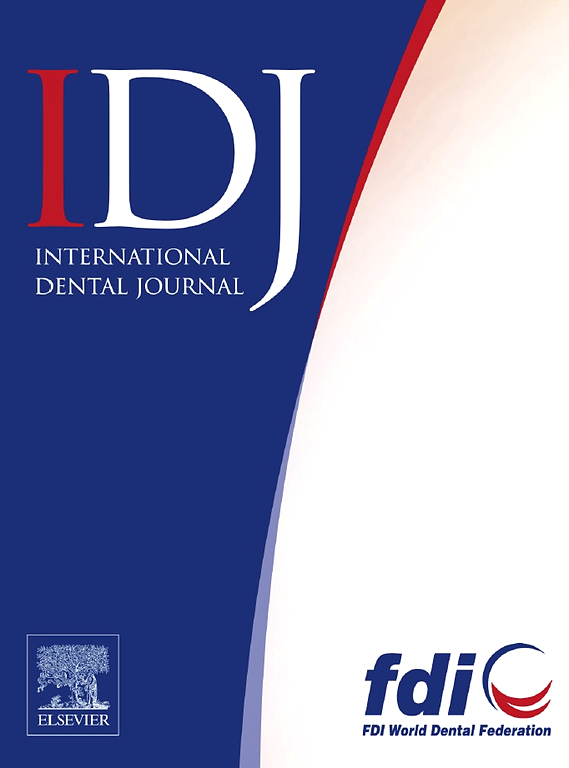外来务工人员口腔健康:文化适应是一个解释因素吗?
IF 3.2
3区 医学
Q1 DENTISTRY, ORAL SURGERY & MEDICINE
引用次数: 0
摘要
目的文化适应是健康不平等的重要解释因素。本研究评估了新加坡国际移民工人的文化适应与口腔健康行为、牙科服务利用、自我报告的口腔健康和口腔健康相关生活质量之间的关系。方法共招募了213名外来务工人员,并完成了一份由访谈者管理的社会人口背景、口腔健康相关自我保健实践(口腔卫生、饮食、吸烟和槟榔消费)、牙科服务利用以及自我报告的口腔健康状况和症状的问卷。口腔健康影响概况和短期文化适应量表也包括在内。结果与在本国相比,移民工人在新加坡有更有利的自我保健习惯(经常刷牙,较少吃甜食/甜点,较少咀嚼槟榔和叶子)(所有P <;. 05)。然而,与原籍国相比,新加坡的牙科就诊更为罕见(P = 0.021),与文化适应无关(P = 0.095)。每单位培养增加与减少吃零食的几率较低相关(OR: 0.96;95% CI: 0.93-1.00),减少吸烟的几率更高(OR: 1.07;95% CI: 1.02-1.13)和嚼槟榔/槟榔叶(OR: 1.04;95% CI: 1.01-1.08),牙龈出血的几率较低(OR: 0.97;95% ci: 0.94-1.00)。有身体残疾负面影响者的文化适应得分显著高于无负面影响者(53.88比47.54;P = .010)。结论外来务工人员在东道国定居后采取了良好的口腔卫生行为,但其牙科保健使用率下降。文化适应与行为改变和一些口腔健康指标有关。本文章由计算机程序翻译,如有差异,请以英文原文为准。
Oral Health of International Migrant Workers: Is Acculturation an Explanatory Factor?
Objectives
Acculturation is an important explanatory factor for health inequality. This study evaluated the association between acculturation and oral health behaviours, dental service utilization, self-reported oral health, and oral health-related quality of life of international migrant workers in Singapore.
Methods
A total of 213 migrant workers were recruited and completed an interviewer-administered questionnaire on their socio-demographic background, oral health-related self-care practices (oral hygiene, diet, smoking, and betel nuts consumption), dental service utilization, and self-reported oral health status and symptoms. The Oral Health Impact Profile and Short Acculturation Scale were also included.
Results
Migrant workers had more favourable self-care practices (frequent toothbrushing, less frequent snacking on sweets/desserts, and less chewing betel nut and leaves) in Singapore, as compared to in their home countries (all P < .05). Dental visits were, however, more uncommon in Singapore than in their home countries (P = .021) and were not associated with acculturation (P = .095). Per unit increase in acculturation was associated with lower odds to reduce snacking (OR: 0.96; 95% CI: 0.93-1.00), higher odds to reduce smoking (OR: 1.07; 95% CI: 1.02-1.13) and betel nuts/leaves chewing (OR: 1.04; 95% CI: 1.01-1.08), and lower odds of bleeding gums (OR: 0.97; 95% CI: 0.94-1.00). Acculturation score was significantly higher among those who reported negative impacts on physical disability than in those who did not (53.88 vs 47.54; P = .010).
Conclusions
Favourable oral health behaviours are adopted by migrant workers after settlement in the host country, but their utilization of dental care declines. Acculturation is associated with behaviour changes and some oral health indicators.
求助全文
通过发布文献求助,成功后即可免费获取论文全文。
去求助
来源期刊

International dental journal
医学-牙科与口腔外科
CiteScore
4.80
自引率
6.10%
发文量
159
审稿时长
63 days
期刊介绍:
The International Dental Journal features peer-reviewed, scientific articles relevant to international oral health issues, as well as practical, informative articles aimed at clinicians.
 求助内容:
求助内容: 应助结果提醒方式:
应助结果提醒方式:


